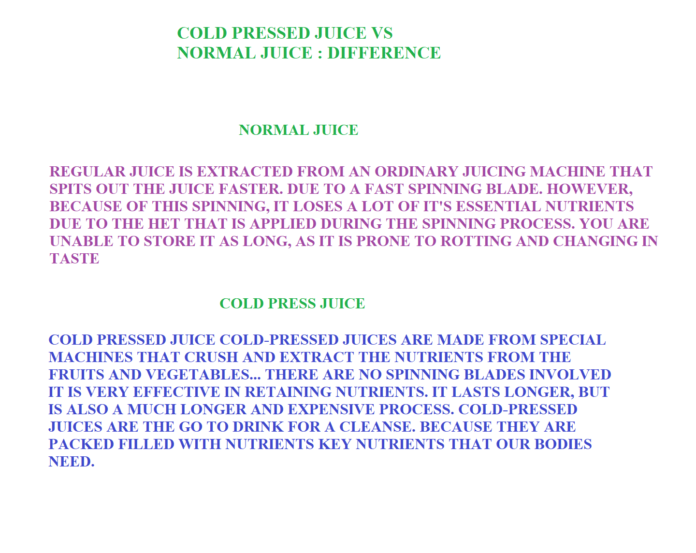Have you ever heard of cold pressed juice but need to know what does this actually mean? Cold pressed refers to a method of extracting juice or oil from fruits or vegetables using a hydraulic press. The press crushes the produce and extracts the juice or oil without generating heat. The resulting juice or oil is often considered to be of higher quality because it retains more of the natural flavors and nutrients of the produce, as the heat and oxygen present in other extraction methods can degrade these. Cold pressing is often used to make juices, essential oils, and plant-based milk.
What is Cold Pressed Juice, and What does it Mean?
Cold-pressed juice is made using a hydraulic press to extract juice from fruits and vegetables. The produce is placed in a chamber, and the press applies high pressure to extract the juice.
The process is called “cold-pressed” because it does not generate heat, which can cause the juice to lose some of its nutritional value and flavor.
Cold-pressed juice is typically made using a slower and more labor-intensive process than other methods of juicing.
Still, it is believed to produce a higher quality juice that retains more of the natural nutrients and flavors of the produce. Cold-pressed juices are often marketed as more healthful than juices made using other methods.
ALSO READ: Best Natural Energy Drinks To Add A Pep In Your Step
Cold Pressed Benefits
Cold pressing is a method of extracting juice from fruits and vegetables using a hydraulic press. The juice is extracted without heat, which can help preserve the nutrients and enzymes in the juice.
Some potential benefits of cold pressed juices include the following:
- Nutrient retention: Because cold pressing does not involve heat, the juice may retain more natural nutrients and enzymes than juices made using other methods.
- Increased absorption of nutrients: Cold pressed juices are typically easier for the body to digest, which can help to increase the absorption of the nutrients in the juice.
Better flavor: Cold pressing can help to preserve the natural flavor of the fruits and vegetables, resulting in a fresher, more flavorful juice.
Longer shelf life: Cold pressed juices can last longer than juices made using other methods due to the lack of heat and the use of a high pressure process to extract the juice. This can make them more convenient for people who want fresh juice on the go.
Environmental benefits: Cold pressing can be more environmentally friendly than other methods of juice production, as it uses less energy and generates less waste.
Cold pressed are also widely used in the juice detox cleansing process to get the toxins out of the body.
What About Hot Pressure Juicers?
Centrifugal juicers, also known as hot-pressed juicers, use a rapidly spinning set of blades to extract juice from fruits and vegetables.
The blades generate heat as they spin, and the juice is also exposed to air, which can begin the process of oxidation.
This process can result in a higher yield of juice, but the heat and exposure to air may also degrade some of the nutrients and enzymes in the juice.
In contrast, cold pressing is a method of extracting juice using a hydraulic press without heat, which may help preserve the nutrients and enzymes in the juice.
There’s an ongoing debate on cold pressed juice vs normal juice, which is better.
What’s the Issue with Heat?
Heat can affect the nutritional content of food in different ways. Heat can sometimes destroy certain enzymes and nutrients, such as vitamin C.
However, in other cases, heat can increase a food’s nutritional content, such as carrots and the increased levels of beta carotene.
Some vegetables are indigestible when raw due to their tough cellulose fiber and need to be cooked in order to be easily digestible.
Some chemicals, such as solanine and chaconine, are present in raw vegetables like potatoes and can cause illness if the vegetables are not cooked before consumption.
It is important to consider the impact of heat on the nutritional content of food and whether or not a particular food must be cooked in order to be safe and nutritious.
ALSO READ: Best Detox Drinks For Weight Loss
Is Heat Good or Bad?
The impact of heat on the nutritional content of vegetables is complex and can vary depending on the specific vegetable.
Some vegetables, such as mushrooms, asparagus, cabbage, and peppers, can release higher levels of nutrients like antioxidants, carotenoids, and ferulic acid when exposed to heat through cooking methods like steaming or boiling.
Spinach is another vegetable that may benefit from being cooked. However, the effects of heat on the nutritional content of vegetables can vary, and it is only sometimes clear whether cold pressing or cooking is the better option for preserving nutrients.
Cold pressing is also used to protect produce from oxidation, which can further affect the nutritional content of the juice.
So the Oxidation is Bad for the Juices?
Oxidation is a process that occurs when the inner flesh of fruits and vegetables is exposed to air, and it can lead to the degradation of nutrients and the spoilage of food.
Centrifugal juicers, also known as hot-pressed juicers, may accelerate the oxidation process by exposing the juice to air as it is forced through spinning blades.
Vitamins B and C and antioxidizing phenolic compounds are particularly sensitive to degradation when exposed to air. To prevent oxidation, it is common to store leftovers in airtight containers and refrigerate foods that would otherwise spoil.
Sell-by dates on food products also reflect the potential impact of oxidation on the quality and safety of the food.
Cold pressing is a method of extracting juice that does not involve exposing the juice to the air, which may help preserve the nutrients and extend the juice’s shelf life.
Is it Worth Investing in Cold Pressed Juices?
While cold pressing can be a more time-consuming and less efficient process compared to other methods of extracting juice, it can result in a more nutritionally dense product.
This is because cold pressing can help to preserve the nutrients and enzymes in the juice, and the juice is typically more concentrated than juices made using other methods.
However, it is generally considered healthier to consume whole fruits and vegetables than juice, as whole produce contains fiber and other nutrients that may be lost during the juicing process.
You can use juice in the detox cleanse process to get rid of toxins.
Suppose you incorporate a variety of whole fruits and vegetables into your diet. In that case, it is generally recommended to do so rather than relying on juice as your primary source of these food groups.
I hope now you know What Does Cold Pressed Actually Mean and what’s better a cold pressed juice vs normal juice.
ALSO READ: BEST HEALTH TIPS FOR MEN AND WOMEN.




